Answered step by step
Verified Expert Solution
Question
1 Approved Answer
please answer all the questions thanks Suppose that the money demand function is given by PMd=L(Y,r+e)=700+0.1Y5000(r+e) where Md is the nominal money balances demanded, P

please answer all the questions thanks
Suppose that the money demand function is given by PMd=L(Y,r+e)=700+0.1Y5000(r+e) where Md is the nominal money balances demanded, P is the price level, Y is total output, r is the real interest rate, and e is the expected inflation rate. (a) Assuming that the asset market is currently in equilibrium at r=0.05. Calculate the nominal money supply Ms if Y=2000,P=2 and e=0.05. What is the velocity of money in this economy? What is the value of k in the quantity theory of money? (b) Assume that the quantity theory of money holds and that velocity is constant at the level you get in (a). In this same economy, the government fixes the nominal money supply (Ms) at 500 . With output fixed at its full-employment level (Y=2000) and assuming that prices are flexible, what will be the new price level? What happens to the price level if the nominal money supply rises to 600 ? Now suppose the central bank follows a money supply rule. In particular, it sets the money supply according to: Ms=1000+0.1Y4000 3 (c) If expected inflation equals actual inflation and =e=0.03,Y=1000, and r=0.02, calculate the price level in this economy. The following part is related to the money growth and inflation. Now start with a general form of money demand function: PMd=L(Y,r+e) (d) Suppose the economy is in long-run steady state equilibrium where output growth is 5%, inflation is 1%, and the interest rate is constant. If the money supply is growing by 4%, what would be the income elasticity of money demand in this economy? Suppose that the money demand function is given by PMd=L(Y,r+e)=700+0.1Y5000(r+e) where Md is the nominal money balances demanded, P is the price level, Y is total output, r is the real interest rate, and e is the expected inflation rate. (a) Assuming that the asset market is currently in equilibrium at r=0.05. Calculate the nominal money supply Ms if Y=2000,P=2 and e=0.05. What is the velocity of money in this economy? What is the value of k in the quantity theory of money? (b) Assume that the quantity theory of money holds and that velocity is constant at the level you get in (a). In this same economy, the government fixes the nominal money supply (Ms) at 500 . With output fixed at its full-employment level (Y=2000) and assuming that prices are flexible, what will be the new price level? What happens to the price level if the nominal money supply rises to 600 ? Now suppose the central bank follows a money supply rule. In particular, it sets the money supply according to: Ms=1000+0.1Y4000 3 (c) If expected inflation equals actual inflation and =e=0.03,Y=1000, and r=0.02, calculate the price level in this economy. The following part is related to the money growth and inflation. Now start with a general form of money demand function: PMd=L(Y,r+e) (d) Suppose the economy is in long-run steady state equilibrium where output growth is 5%, inflation is 1%, and the interest rate is constant. If the money supply is growing by 4%, what would be the income elasticity of money demand in this economyStep by Step Solution
There are 3 Steps involved in it
Step: 1

Get Instant Access to Expert-Tailored Solutions
See step-by-step solutions with expert insights and AI powered tools for academic success
Step: 2

Step: 3

Ace Your Homework with AI
Get the answers you need in no time with our AI-driven, step-by-step assistance
Get Started


